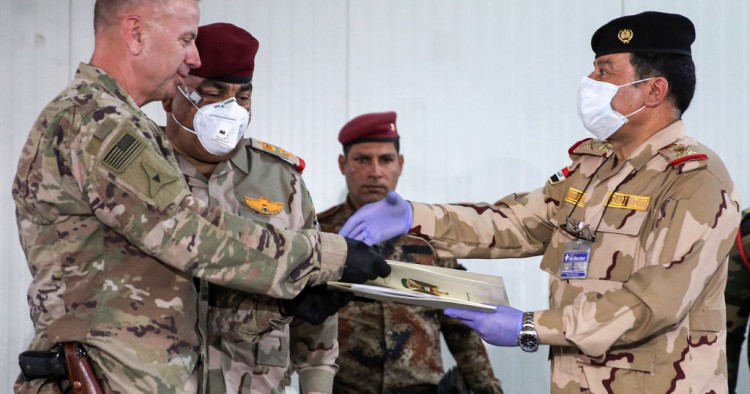The proliferation of COVID-19 across the Middle East and North Africa poses a potentially significant challenge to governments countering insurgency and terrorism, particularly from religiously inspired actors. In recent weeks, a broad array of jihadist movements affiliated with al-Qaeda and ISIS have expounded on how the virus was an illustration of God’s power on earth and principally, a tool wielded in order to weaken the enemy and leave it vulnerable to attack. While acknowledging that COVID-19 poses a risk to all humankind, the prospect of dying from the virus has been presented as martyrdom, an act of virtue. Given such circumstances, it would be surprising if jihadist groups were not seeking to take advantage of weakened state security capabilities and delicate social and political dynamics.
For now, local governments across the region do not appear to have significantly withdrawn security forces from the streets, but in active threat zones, the capacity to launch major operations will likely be constrained for at least several months once the virus begins its inevitable surge. From intensive war zones like Syria, Yemen, Libya, and Afghanistan to lower-level threat environments like Iraq, Egypt, Algeria, and Turkey, malign actors are likely to attempt to take advantage.
One intriguing consequence of the COVID-19 pandemic has been the apparent acceleration of a U.S. military constriction in Iraq. In recent days, American troops operating within the counter-ISIS Operation Inherent Resolve (OIR) have pulled out from sizeable facilities in al-Qaim, Q-West, and K1 bases and from the Ninewa Operations Command, transferring authority to Iraqi Security Forces (ISF). Though those moves were pre-planned, their timelines have been moved up due in part to the COVID-19 challenge. OIR has also substantially limited ISF training programs and partnered counter-ISIS operations. Although the ISF is better placed to inherit authority than when the U.S. military fully withdrew from Iraq in 2010-11, it will be unable to prevent malign Iran-backed militias from benefiting in some areas, like al-Qaim for example. Looking longer term, premature U.S. withdrawals from key outlying facilities raises the risk that a currently weakened ISIS will face more amenable environments to attempt to return and escalate operations. You cannot defeat a terrorist organization while your forces are holed up in vast bases long distances from where the enemy is attempting to regroup.
Charles Lister is a Senior Fellow at MEI and the Director of the Countering Terrorism & Extremism Program
Photo by AHMAD AL-RUBAYE/AFP via Getty Images
مكافحة الإرهاب أمام تحد جديد
تشارلز ليستر
مع انتشار وباء كورونا في الشرق الأوسط وشمال أفريقيا، ترتفع وتيرة التحديات المحتملة أمام الحكومات، التي تواجه حركات إرهابية تستلهم الخطاب الديني. وفي الأسابيع الماضية، ادعت جهات مرتبطة بالقاعدة وتنظيم داعش أن الوباء هو "جند من جند الله" لمعاقبة "أعدائه وإضعاف مقاومتهم" والتذكير بقدرة الله غير المحدودة على الأرض. وفي الوقت الذي يضع انتشار الوباء البشرية جمعاء أمام تهديد خطير، ترى هذه الجهات أن الموت من جراء الوباء "فضيلة" والميت، عند الله، "شهيد".
واعتمادا على هذه المعطيات، سيكون من المفاجئ ألا تسعى الجماعات الجهادية للاستفادة من تفكك الديناميات الهشة اجتماعيا وسياسيا في هذه الدول، واستغلال الوهن الذي أصاب قدراتها الأمنية والعسكرية.
حتى تاريخه، لا توجد مؤشرات على انسحاب القوات الأمنية في هذه الدول من الشوارع. إنما وبمجرد أن يبدأ الفيروس بالانتشار السريع، خلال الأشهر المقبلة، ستتضاءل قدرة هذه الحكومات على شن عمليات واسعة في مناطق التهديد الرئيسية. والأرجح أن تحاول هذه الجماعات "الخبيثة" الاستفادة من الوضع خصوصا في الدول التي تشهد حروبا أهلية كسوريا واليمن وليبيا، وتلك التي ما زال مستوى التهديد فيها متدنيا كالجزائر ومصر والعراق وتركيا.
تمثلت أولى النتائج المهمة، المترتبة على انتشار وباء كورونا، في تسريع انسحاب القوات الأميركية في العراق المنضوية في إطار "عملية العزيمة الصلبة" في تقليص تواجدها ومناطق انتشارها. ومؤخرا انسحبت القوات الأميركية من القواعد العسكرية في القائم والقيارة (قاعدة Q-WEST) وكركوك (قاعدة K 1) وقيادة عمليات نينوى، وسلمت مواقعها لقوات الأمن العراقية. ورغم أن هذه الانحسابات كانت مبرمجة مسبقا، إلا أن انتشار الوباء قد يكون سببا في تسريع وتيرتها. فضلا عن ذلك، فقد تم تقليص الأنشطة في برنامج تدريب قوات الأمن العراقية والعمليات المشتركة ضد تنظيم داعش.
على الرغم من أن قوات الأمن العراقية تتمتع اليوم ببنية أفضل بكثير، مما كانت عليه إثر انسحاب الجيش الأميركي الكامل من العراق 2010 -2011، ما يؤهلها بشكل أفضل لتسلم زمام الأمور، إلا أنها ليست قادرة على منع الميليشيات الموالية لإيران من تحقيق مكاسب في بعض المناطق، (منطقة القائم المحاذية لسوريا على سبيل المثال). وعلى المدى البعيد، فإن انسحاب القوات الأميركية السابق لأوانه، من المنشآت العسكرية الرئيسية، يزيد من احتمالات تمكن تنظيم داعش، الواهن حاليا، من إيجاد بيئات سهلة لإعادة تنظيم نفسه وتصعيد عملياته. ذلك أن هزيمة تنظيم إرهابي لن تكون ممكنة حين تكون قواتك محصنة في قواعد عسكرية بعيدة جدا عن المناطق التي ينشط فيها لإعادة تنظيم نفسه.
The Middle East Institute (MEI) is an independent, non-partisan, non-for-profit, educational organization. It does not engage in advocacy and its scholars’ opinions are their own. MEI welcomes financial donations, but retains sole editorial control over its work and its publications reflect only the authors’ views. For a listing of MEI donors, please click here.













